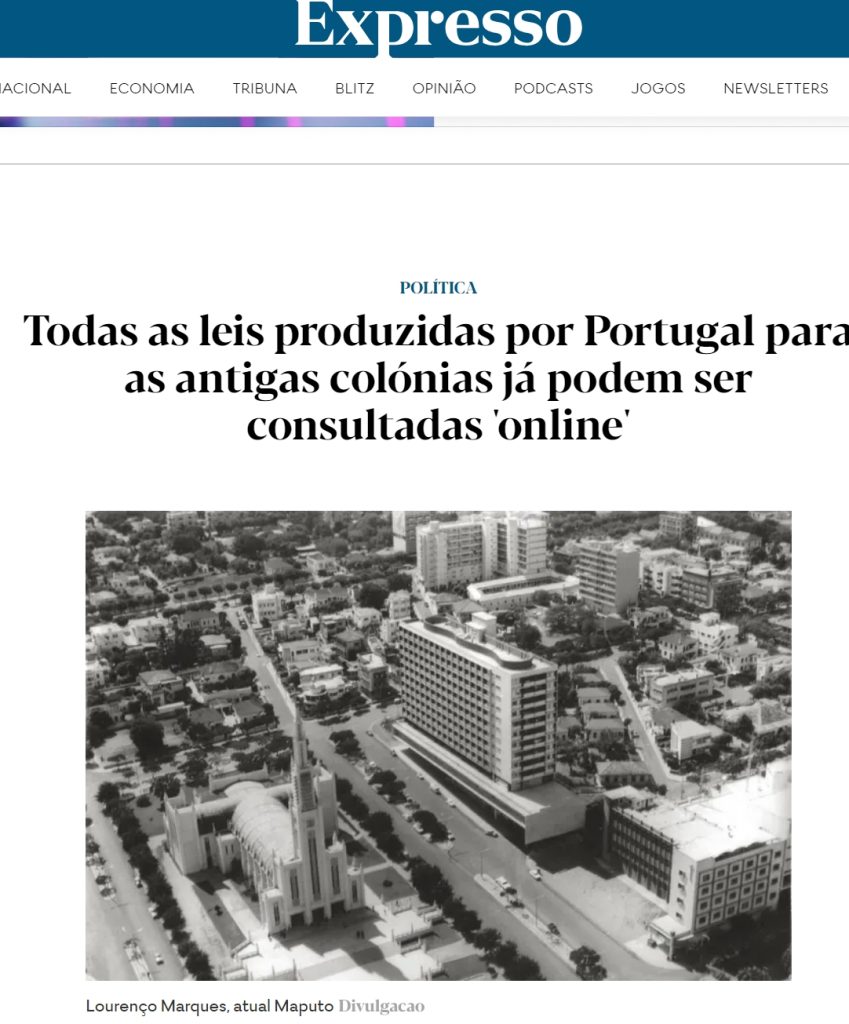CEDIS is proud to make 4 invaluable databases available through open access.
These databases were built over the 20 years of the existence of CEDIS, with the last one being completed in 2024. They were all (co-)coordinated by Cristina Nogueira da Silva, the current CEDIS researcher and a Professor at NOVA School of Law, and developed within the scope of (co-)funded projects by the Foundation for Science and Technology (FCT), with CEDIS being the Host institution for each of them, either as the Proponent or as a Participating Institution with its own funding.
The first database, containing Portuguese Legal Doctrine (19th and 20th centuries), is known as the “António Manuel Hespanha Digital Archive”, as it was conceived by this great Portuguese legal historian, former Professor at NOVA School of Law and Cedis researcher. It offers an electronic edition of the main Portuguese legal literature from the 19th century to the first half of the 20th century. This repository is a treasure trove for scholars who wish to understand the evolution of legal thought in Portugal during a period of profound social and political transformations.
The second database, Legislation of the Kingdom and Empire, 1496-1910, known as the “O Governo dos Outros Digital Archive”, provides access to the legislation enacted during the period for the Kingdom and the Portuguese Empire. This collection provides a comprehensive view of the legal dynamics that shaped Portuguese colonial administration and expansion.
The third database, Colonial Legislation, 1910-1970, the “Legal Pluralism Digital Archive”, covers the 20th century, offering a compilation of Portuguese colonial laws. This resource is crucial for understanding colonial policies and the administration of overseas territories during contemporary times, providing a solid basis for research into the impact of colonialism and the transitions to independence.
This set is completed by the Database “Legislation: Workers and Work in Portugal, Brazil and Portuguese Colonial Africa”, which compiles legislation on slave, forced and free labor in Portugal, Brazil and Portuguese Colonial Africa. This Database involved the participation of a Portuguese team also coordinated by Professor Cristina Nogueira da Silva at CEDIS. The General Coordinator was Sílvia Hunold Lara, a Researcher at the Centre for Research in Social and Cultural History at the University of Campinas.
With these databases, CEDIS provides researchers and citizens, regardless of their location, with unprecedented access to a vast and chronologically comprehensive corpus of documents, indispensable for an in-depth knowledge of Portuguese legislation and doctrine over the centuries, revealing the nuances and complexity of Portugal’s legal history. What until then could only be found in printed form in a few archives and libraries with difficult access, practically restricted to accredited researchers who were able to be on the spot – therefore inaccessible to the majority of the population of the countries that were colonised by Portugal – is now accessible to anyone, anywhere in the world.
These databases, therefore, represent a milestone in the democratization of knowledge and in supporting quality research, allowing scholars and enthusiasts from around the world to explore, analyze, and better understand the history of Portugal and its colonies.
In addition to these 4 databases, in line with the “Open Science” policy, our aim is to ensure that the public has unrestricted access to a vast literature. CEDIS contributes funds from FCT, I.P. to the construction of the NOVA Law School Library, a public library that makes books, magazines, databases and other resources available online. Our library serves not only our researchers, but also all citizens, and is widely used by students, legal professionals, researchers and organisations outside our institution.
Jornal Notícias ao Minuto
Quase 70 mil páginas de leis das colónias portuguesas disponíveis onlineJornal Notícias ao MinutoCerca de 70 mil páginas de legislação produzida por Portugal para as antigas colónias, entre 1910 e 1970, foram digitalizadas e vão estar acessíveis ao público, foi...
Jornal Sapo 24
Regresso ao passado: quase 70.000 mil páginas de leis das colónias portuguesas podem ser consultadas onlineJornal Sapo 24Cerca de 70 mil páginas de legislação produzida por Portugal para as antigas colónias, entre 1910 e 1970, foram digitalizadas e vão estar...
Jornal Observador
Quase 70.000 mil páginas de leis das antigas colónias portuguesas podem ser consultadas onlineJornal ObservadorCerca de 70 mil páginas de legislação produzida por Portugal para as antigas colónias, entre 1910 e 1970, foram digitalizadas e vão estar acessíveis ao público....
Jornal Público
Quase 70 mil páginas de leis das colónias portuguesas podem ser consultadas onlineJornal PúblicoQuase 70 mil páginas de leis das colónias portuguesas podem ser consultadas online Cerca de 70 mil páginas de legislação produzida por Portugal para as antigas colónias,...
Jornal Expresso
Todas as leis produzidas por Portugal para as antigas colónias já podem ser consultadas 'online'Jornal ExpressoCerca de 70 mil páginas de legislação produzida por Portugal para as antigas colónias, entre 1910 e 1970, foram digitalizadas e vão estar acessíveis ao...












